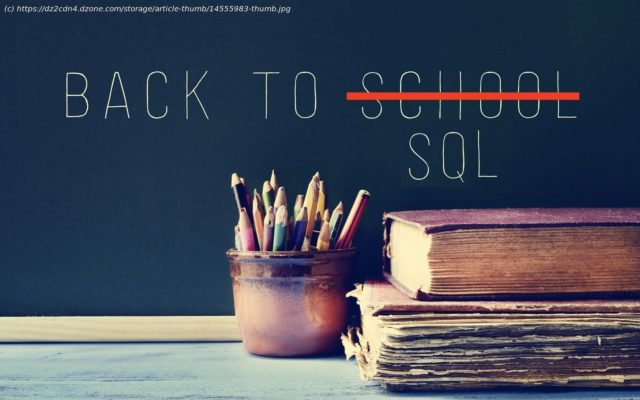SQL has transformed itself from a specialized skill to a core requirement for all data-related jobs. What can be done to educate more professionals in this …
Join the DZone community and get the full member experience. After looking at SQL’s impressive 50-year reign and what we could learn from it, let us now focus on how we can learn it. Not only is SQL everywhere, but it is also in high demand. A quick search of job boards easily reveals not only that virtually all of the S&P 500 companies are hiring for SQL skills, but that the demand for them is even higher than more ‘high-tech’ languages like R and Python. With such great demand, it should be obvious that this ‘ancient’ language is being taught far and wide to everyone starting as early as possible. Surprisingly, this could not be further from the truth. This article will discuss the wide-ranging benefits of learning SQL, how we can transform the current curriculum and the drastic split from coding that will have to happen. There are many advantages to learning SQL other than just being able to handle your own ad-hoc data queries. I am not planning to make a comprehensive list here, but some of the most obvious benefits are: SQL is very easy to learn and does not require an extensive computer science education to understand. At the same time, it does teach some of the basics of programming and can be used as a springboard to learn other languages such as JavaScript or C++. A quick search through postings on your favorite job site will quickly confirm that SQL is truly everywhere. Doesn’t matter if you are looking at established tech companies, rising startups, or Fortune 500 giants the odds are that they are looking for at least a Data Analyst with basic SQL skills. SQLs grasp on society is truly astonishing if you give it a good look. It effectively acts as a minimum requirement for any data-related job imaginable. Once mastered having SQL skills increases your marketability for an entire host of professional roles. From Back-end Developers to Data Scientists most employers value these skills. In fact, so much so that you will have to be careful that it doesn’t turn into your full-time job regardless of your other qualifications. Many highly skilled PhDs have been caught in a position where years of research are being trumped by their SQL in the job market. Even though it is fairly easy, SQL includes many powerful features and allows you to retrieve data from many different databases, which makes it incredibly versatile. This is why it ranks even higher than Python for data-related jobs. Lastly, we can also be fairly certain that SQL has a secure future. This is due to a variety of complex reasons which I discussed in my last article, and if you still aren’t sure just check what the experts are saying. All this talk about SQLs high demand in the corporate world still misses the larger picture. Knowing how to write emails is a skill that extends far beyond its obvious uses inside an office. The same way data collection goes far beyond its job-related use cases. At its core SQL is the basic vocabulary of one of the most essential skills in the digital world we live in now, and is set to become one of the basic tools of existence in the modern world. The everyday individual will create and digest ever-increasing amounts of information in their everyday life. As we produce and collect more and more data, we will either develop the skills to own and control it or be forced to rely on third parties to control it for them. SQL doesn’t go all the way when it comes to empowering individuals with their data, but it goes far enough to make a difference. This is why educators around the world would be wise to rethink their priorities and start preparing their pupils for a world where being able to efficiently query large databases is as important as having proper grammar. This, by the way, is not just restricted to SQL. Being able to use APIs, visualization software such as Tableau and Power BI, and other query languages such as R’s tidy models should be included in this debate.






